Mental Health Apps
We use our phones for everything and nearly always have them with us. We have apps for staying social, tracking exercise, playing games, and everything in between. Apps can also be a great and easy way to support your mental health goals and work in counseling. Using mental health apps as part of a wellness journey has been shown to help users increase their awareness of their emotions and lower symptoms of depression and anxiety. They are also incredibly accessible. Many of these apps are free and once you download them, they are readily available in your pocket whenever or wherever you might need. From tracking your mood to practicing and recording therapeutic exercises outside of the counseling office, mental health apps span a vast array of topics. One of the best benefits of technology is the ability to find the tool that’s goals align with yours.
As with everything, though, there are some potential downfalls. The app may not be the best for your specific needs or goals, you may worry about privacy, or it might just not be the right choice for you. Apps are not therapists, so it is best to use this as one of many resources on your mental health journey. If you are seeing a therapist, it is best to talk with them about how you plan to use a mental health app and invite them in as an active partner in your use.
When scrolling through the app store, it can be overwhelming at the sheer number of apps out there. Although I am sure each one has something to offer, the vast pool of mental health apps to choose from might flood your emotional energy or feel like too much work to wade through. To help you take the first step, here are 10 great mental health apps to explore and potentially add to your arsenal of therapy tools!
Mood tracking
Moods

Moods is easy to use and allows you to customize the moods you want to track with options from the app, descriptions of your own, or even emojis. This app uses functions of your phone to help you track information like your location and setting reminders to check in. You can see and email summaries of your week and find patterns over time. Moods is great for people who love to have as much information as possible, and makes it easy to share with your support team or therapist.
Daylio
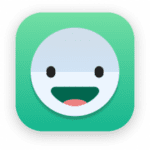
Like Moods, you can customize how you track emotions in Daylio; in fact, most things in this app are customizable. You can also track activities, make goals, and set reminders. Daylio creates monthly and yearly summaries of your information which makes it easy to track patterns among the different areas (like mood and type of activity). Daylio offers more than other mood tracking apps, which makes it ideal for someone whose goals span emotional, behavioral, and social parts of life.
Emoods
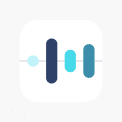
Emoods is similar to other mood tracking apps, but has extra features specifically designed for the needs of those with Bipolar Disorder. Not only can you track mood, but also symptoms and signs like weight fluctuation, medication management, and psychosis. Emoods creates monthly reports of your data you can download to share with your therapist or other support systems. This app is ideal for someone who wants all their information in one place for easy tracking over time, especially if a Bipolar Disorder diagnosis is new and you are starting to understand your own rhythms and triggers.
Thought tracking
Thought diary
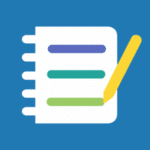
Similar to mood tracking apps, Thought Diary allows you to track how you are feeling but takes it a step further by walking you through the process of identifying and challenging any negative or intrusive thoughts. This app is simple and easy to use. If your goals include addressing cognitive distortions, using CBT tools to combat negative self talk, or if you walk through thought challenging with your therapist but have difficulty doing it on your own, this app is perfect.
What’s up
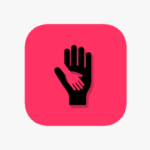
What’s Up combines features from mood tracking apps and thought tracking apps. The app is PIN protected, but also allows you to share your information with others if you want to. Along with the ability to track emotions and thoughts, What’s Up can guide you through coping skills like grounding and breathing exercises. This app has tons of information, which is awesome, but at times can feel overwhelming. What’s Up is perfect if you like learning about symptoms, practicing coping skills on your own, and want to be reminded of your goals often.
SI/Self harm
My3
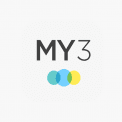
My3 is a wonderfully simple and easy app for anyone with suicidal ideation or other self harming behaviors. You can save the information of three trusted people in the app as well as customize messages. When you open My3, you have the option to call 911, call the Suicide Prevention Hotline, or contact your three contacts with a prewritten text. My3 also walks you step-by-step through creating a safety plan which you can email to your therapist or others. This app is a great way to ask for help in one place, even when it feels difficult.
Calm harm
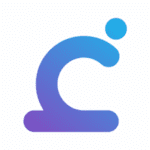
Calm Harm was created to assist with managing self harm thoughts and behaviors. It is password protected for privacy, and full of activities to “ride out” the urge to self harm. The app will guide you through distraction, breathing, and other techniques for between 5 and 15 minutes at a time, then check in with you. A particularly helpful feature is a random selector for activities if you can’t choose or decide. This app is helpful for anyone working to decrease self harming thoughts and behaviors.
Anxiety
SAM
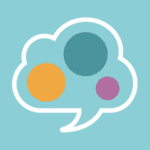
Self-help Anxiety Management (SAM) is similar to other thought or mood tracking apps, but tailored specifically for anxiety symptoms. It includes tools to help you track general or specific anxiety, as well as activities such as breathing exercises. Additionally, SAM uses chat forums to connect users with similar symptoms or experiences for support. This app is great for someone whose main focus in counseling is lowering anxiety, or addressing anxious thoughts.
OCD
nOCD

nOCD is a great tool to use in conjunction with therapy to address and decrease obsessive thoughts or compulsions. The app is full of educational material, things to read, message boards to connect with other users, and information about OCD symptoms and treatments. nOCD exercises and activities are based on Exposure and Response Prevention therapy techniques, which is best done with a therapist. If this isn’t part of your treatment, there is still lots to do, but if it is, you and your therapist can use these nOCD activities to structure and track homework easily. All the data stored in nOCD can be emailed to your therapist or other support people as well.
Eating
Rise Up

Although Rise Up describes itself as an app for “eating disorders”, it can be helpful for anyone wanting to improve their relationship with food or manage food related symptoms (bingeing, restricting, fluctuating appetite, skipping meals, risky behaviors with food, etc.). Your information stays private with a PIN, but can be easily downloaded to a PDF file for review with your therapist, nutritionist, or doctor. Rise Up provides a log for meals and snacks, as well as places to log activities, moods, and medication management. The app also houses resources and guidance through coping skills such as mindfulness exercises.
Mental health is a journey and sometimes we need to employ more tools! Our phones are handy devices not only for texting and social media, but also for ready access to activities, exercises, and resources to support your goals. If this is something you want to try, talk with a therapist at Optimum Joy about how a mental health app (one of these or another) could aid or enhance the work you are already doing. Give us a call today!
Written by therapist Megan Hanafee Major